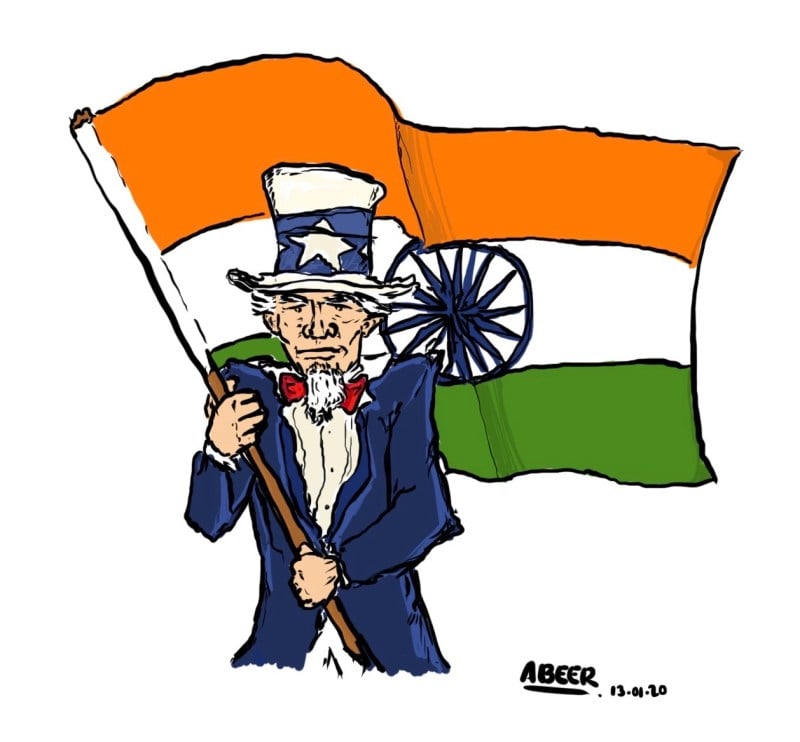There are several ways to begin a conversation on India’s democracy.
The historian Ramachandra Guha calls it “unlikely” — he concludes his 900-page monograph on the history of modern India simply with the phrase “India endures.”
India endures, despite it spanning dozens of genetically distinct languages, tens of thousands of dialects, ethnicities and cultures and a sprawling collective history matching continental Europe in its conflicts and complexity. India’s leaders and people fiercely held on to their constitutional democracy. As nations around India triumphed and failed, as the Cold War froze and thawed, India remained the stolid reminder to the rest of the world that freedom was no Western privilege.
Here was a brutally impoverished country, surrounded by dictatorial adversaries and suspended in internecine conflict, with no business being a democracy. And yet, India endures.
The Constitution of India, like the Constitution of the United States, was the product of the willpower of industrious nationalists, possessed by radical notions. In both cases, democracy was a gamble taken in defiance of empire. The first three words of each constitution cement the extraordinary scope of their framers’ ambition: “We, The People.” In the new nation this document would create, the government’s power is derived from the declaration of the will of the governed.
It is accurate then that while Indians inherited the British mannerisms of parliamentary democracy from our former masters, we inherited America’s constitutional spunk. The Indian spirit of democracy is rooted in the same spirit as its American antecedent. It is a spirit rooted in the defiant hope of a young nation, yearning to breathe free of tradition and authority.
It is, in fact, such a spirit that is enshrined in the character of this University. The rejection of the regressive and the reactionary, the open embrace of change, the adoration of struggle and the willpower of the dissatisfied — all of these things share among them the unflinching admission of the improbability of success. But they do not share the fear of failure from trying.
America has looked to India to find a friend and a teacher, just as India has looked to it. Though the Cold War would have them on differing planes, we shared the common tongue of democracy. The exchange of people and ideas between both nations has led to phenomenal innovation and social change.
Today, that tongue is dying. With the rushed passage of the Citizenship (Amendment) Act, 2019, Indian Prime Minister Narendra Modi seems to be a fervent ambassador of Winston Churchill’s position in 1931 that “India is no more a unified country than the Equator.”
In Modi’s mind, India has no business being what it is either — a stable, constitutional democracy with a free press and institutionalized checks and balances.
Modi would seemingly rather have an India embittered with itself, a hopeless India. His intent is evident in his administration’s repeated attacks on the character of India’s constitution, of which the Citizenship (Amendment) Act is an important part. The newly-passed amendment, which allows the Indian government to utilize data on religious inclinations as a factor in determining Indian citizenship, is the most audacious move yet to tear down the framers’ vision of a pluralistic, progressive Indian state, replacing it with a communal nightmare.
At a time when the United States is facing unprecedented competition from decidedly undemocratic regimes, it cannot afford to lose India. With the dismantlement of India’s political fabric and economy (Modi is not good on economics), the United States would lose an Asian bulwark, a vital economic partner and the non-Western world’s best argument for democratic freedoms. And while it is difficult to convince President Donald Trump that America needs friends, it is patently clear that a democratic India is a better partner on climate change, international order, press freedoms and free trade than is an authoritarian India.
The Citizenship (Amendment) Act has been met with a remarkable display of willpower by the Indian people. Across India’s cities and villages, hundreds of thousands have gathered to voice their rejection of the takeover attempts on their constitution, just as we expect Americans would do for theirs.
University students have been at the forefront of the protests and thereby a prime target for the Indian police and partisan mobs, which have raided campuses and dorms, arrested students and professors and shot at peaceful demonstrators, sometimes maiming or killing them. The government has responded with mass arrests, Internet shutdowns, arbitrary detentions, incarceration in detention centers and deportations.
At this time, the United Nations High Commissioner for Human Rights has stated that the law is “fundamentally discriminatory,” and the U.S. Commission for International Religious Freedom has recommended sanctions against the Home Minister of India, Amit Shah. This is not to mention the growing chorus of legal scholars in India and abroad that have stated that the law is unconstitutional.
Amidst rumblings of potential genocide, the United States has a moral and strategic prerogative in preventing the collapse of the world’s largest democracy. Make no mistake, India is the new battlefield between democrats and tyrants. And in spirit, Jefferson would be standing with Jawaharlal on the steps of Shaheen Bagh in Delhi, where a frigid winter has failed to deter thousands of elderly women protesting against the assault on their sons and daughters by their government.
When members of the academic community are threatened with violence anywhere, Stanford should not, and will not be silent. Hundreds of students have expressed support in staging a protest rally this Friday at White Plaza at noon, many of them in defiance of the Indian government’s surveillance-guided efforts to intimidate dissenting citizens.
Again, India shall endure, and its deliverance aided with those three words: “We, the People.”
This article has been corrected to reflect that Winston Churchill said, “India is no more a unified country than the Equator” in 1931, not 1941. The Daily regrets this error.
Contact Abeer Dahiya at adahiya ‘at’ stanford.edu.
